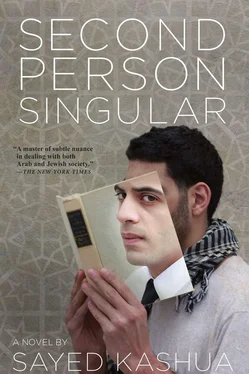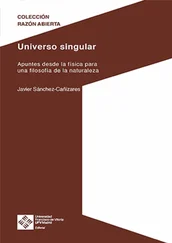The lawyer, waiting in traffic, cursed the car ahead of him. He had to stop himself from leaning on the horn. Maybe she was just trying to soothe him. Maybe she was just shaken by the fact that he’d found the letter, maybe she was afraid he didn’t believe her? And with good reason. He imagined her laughing out loud, in a voice that wasn’t even hers.
“I just talked to him,” he heard her tell the man by her side. “He’s on the way to court, nothing to worry about. He bought the whole story, doesn’t suspect a thing.”
The lawyer tried to find a shortcut and turned off Hebron Way toward Talpiot. He wasn’t sure where to go — to family court, to catch her in the act? But what would he do then? Laugh? Cry? What would he do when she tossed him that scornful look, proud for having beaten him? She’d be safe there. What could he do to her in front of all those policemen and courthouse security guards.
And maybe the best thing was to simply go to the Sharia court this instant and file for divorce there. But that wouldn’t help either. If she was already at family court then it was over, the civil court system had jurisdiction. The lawyer decided to drive by her work to see if her car was parked outside. That way he could continue on with his plan. “Just a little wrinkle,” the lawyer mumbled to himself. “Just a little wrinkle.”
He replayed the brief conversation with his wife. What were the noises he’d heard in the background? He wasn’t sure. Was there that kind of din in the family court already at this hour? Did he even hear much noise? Actually it had been completely quiet. Was her office completely quiet? Where did she work on Sunday morning anyway? At the clinic? Or the office? What an idiot. What an ass he’d been all these years. He didn’t so much as have his wife’s number at the office. Now he knew why she always called the office and not his cell: so she’d know exactly where he was at any given moment. “No,” he’d heard her say, “it’s because I never know when you’re available.”
The lawyer tried calling her back on her cell. At the very least this time he would make a point of listening to the background noises. But what would he say? Would he ask her if she wanted to meet for lunch? That would be unprecedented. What would he ask her: Where are you working today? Why did he want to know that? The lawyer couldn’t come up with a convincing reason and, at any rate, she didn’t pick up. A meeting; the lawyer smiled and told himself he had married someone with a superior mind. The first thing he would do was look for her car outside the social services office in Talpiot. She went in to that office at least twice a week, of that he was certain. If not, then he’d go to that fucking mental health clinic of hers. And if he didn’t find her car there, either? Well. . He honked at the car in front of him.
CORPSE
Pushing the key into the lock, I hoped that nothing had changed. The weekend edition of the paper waited beside the door, wrapped in a plastic bag, covered in dew. I picked up the paper, shook off the drops, and opened the door.
Ruchaleh was on the couch, awake, looking terrible. Her eyes were puffy, her gaze was fixed on the ceiling, and there were two empty bottles of red wine on the table. The sun had risen but the blinds were still shut and the only light in the room came in from the kitchen. I said nothing. I stood in the entryway and waited for her to turn toward me. There was no need for me to go up to the attic. Something clearly had changed. Moving slowly, Ruchaleh turned and looked at me. Then, making a great effort, she smiled and moved her head up and down, again and again.
“Do me a favor,” she said, “and don’t stare at me with that pitying look.”
I froze, even though what I wanted to do was run to her and hug her and tell her that I loved her. I wouldn’t care if she said something like, I can’t stand histrionic people, or What a pathetic Arab. I wanted to fall into her arms, console her, be consoled, receive a warm hug, and hear her whisper in my ear, “Don’t worry, Mommy’s here,” in a voice that would soothe all my fears.
“What are you doing standing there like a golem?” she said. “It’s over, it’s done.”
“It’s just beginning,” I found myself saying, completely unsure of what I meant.
“I can’t stand,” she chuckled, and then she was quiet for a moment before adding, very softly, almost apologetically, “Come here, you little dunce.” I walked over to her and she hugged me harder than ever before and she wasn’t even taken aback when I lay my head on her chest. She hugged me as though I were hers, and I, on my knees, on the floor, burying my head in her chest, tightening my grip, tried to make myself more and more hers. I didn’t look up but I knew she was crying. She groaned in pain and her body shook. “What are you doing crying like a little kid?” she asked me in a wavering voice, stroking my hair. I knew she was silently saying, “Stay here, stay here with me.” I stayed until she fell asleep and only then did I break her embrace.
“ A’rib ?” the man in charge of burials in Beit Safafa asked over the phone.
“ A’rib ” I answered in Arabic. Stranger.
“So then it will be a small funeral,” he said.
“There will be no funeral,” I said.
“You have permission for burial?”
“Yes, I got it from the hospital.”
“You know where to bring him?”
“No.”
“You know the small mosque near the cemetery?”
“I’ll ask.”
“Okay, bring him there,” he said. “Ask anyone in the village and he’ll direct you there. Everyone knows where the cemetery is.”
“Okay, thank you very much.”
“Allah Yirachmo, ” God have mercy, said the man to whom death was a livelihood.
Equipped with the signed certificate of death and the ID card, I set out in Ruchaleh’s car for the morgue at Shaare Zedek, where Yonatan’s body was being stored. An older nurse looked at my paperwork and made a feeble attempt at empathy.
“How are you taking him?” she asked.
“Ambulance,” I said right away, and she nodded.
“Should I order one for you?”
“Yes, please.”
“Okay, you can wait over there,” she said, pointing her chin in the direction of a small waiting room. Then she picked up the phone and began to dial.
A small TV, resting on a metal arm that protruded from the wall, showed soundless footage from the government channel. Two stern-looking men spoke to one another. One, who looked like the guest, was religious, with a black yarmulke, a thick beard, a white shirt, and a black jacket. The man who looked like the host wore a knitted yarmulke and a blue dress shirt. His beard was trimmed and sculpted. Every once in a while a few passages from the Bible appeared on the screen and then disappeared. The two men were visibly excited, waving their fists, punctuating with their hands, making expansive gestures, smiling at the camera, twisting their faces into occasional grimaces, underscoring again and again their wonder at the potency of Biblical verse.
“Shalom,” the Arab ambulance driver said to me in halting Hebrew, perhaps on account of my clothes and perhaps on account of my physical appearance.
“Shalom,” I responded, rising to my feet.
“You’re accompanying the body, right?” he asked with no preamble and no superfluous attempts at commiseration.
“Right.”
“To Beit Safafa?”
“Yes, to the small mosque near the. .”
“Yeah,” the driver said, handing me a copy of some paperwork, “I know the place. I’m from there. You going to follow me?”
The driver lit a cigarette on the way to the ambulance, giving his younger assistant time to walk over to the stretcher and the enshrouded body and push it toward the ambulance. The driver opened the back doors and the younger man pushed a button on the stretcher and shoved it into the ambulance, the legs of the stretcher folding into the track.
Читать дальше












